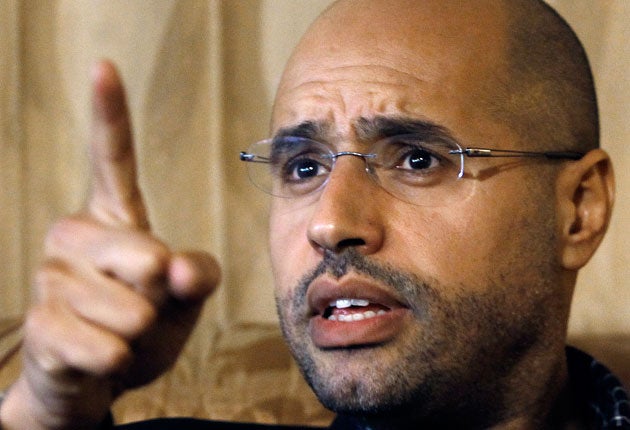Court 'in talks with Gaddafi son'

Your support helps us to tell the story
From reproductive rights to climate change to Big Tech, The Independent is on the ground when the story is developing. Whether it's investigating the financials of Elon Musk's pro-Trump PAC or producing our latest documentary, 'The A Word', which shines a light on the American women fighting for reproductive rights, we know how important it is to parse out the facts from the messaging.
At such a critical moment in US history, we need reporters on the ground. Your donation allows us to keep sending journalists to speak to both sides of the story.
The Independent is trusted by Americans across the entire political spectrum. And unlike many other quality news outlets, we choose not to lock Americans out of our reporting and analysis with paywalls. We believe quality journalism should be available to everyone, paid for by those who can afford it.
Your support makes all the difference.The International Criminal Court is in indirect negotiations with Muammar Gaddafi's son about his possible surrender for trial, the chief prosecutor said today.
Luis Moreno-Ocampo said talks were being held through intermediaries, whom he did not identify.
He said they wanted to assure Saif al-Islam Gaddafi that he would receive a fair trial and that he could be helped to find a new country of residence if acquitted.
He said he did not know exactly where Saif Gaddafi is.
The 39-year-old was reported to be heading through the desert to Mali, where the former Libyan intelligence chief Abdullah al-Senoussi fled on Wednesday.
Saif Gaddafi and al-Senoussi were indicted in June for unleashing a campaign of murder and torture to suppress the uprising against the Gaddafi regime that broke out in February.
Mr Moreno-Ocampo said he believed Saif Gaddafi was also in touch with unidentified mercenaries offering to find him refuge in an African country that does not co-operate with the court.
He mentioned Zimbabwe as a likely possibility, and said the court was in contact with other countries to prevent Saif Gaddafi's escape by denying any plane carrying him permission to fly through its air space.
"We are having informal conversations with Saif Gaddafi in order to see if he can be surrendered to the court," Mr Moreno-Ocampo said in The Hague.
"We know he has a different option because apparently there is a group of mercenaries willing to move him to a country, probably Zimbabwe," the prosecutor said. Some of the mercenaries may be from South Africa.
Saif Gaddafi was pressing for clarifications about his fate should he be acquitted, and Mr Moreno-Ocampo said he has made it clear to the fugitive that he could ask the judges to send him to a country other than Libya.
"He says he is innocent and he will prove his innocence," the prosecutor said.
Mr Moreno-Ocampo also said the court was waiting for documentary evidence confirming the death of Muammar Gaddafi to formally close the case against him.
Saif al-Islam, whom the court described as the de facto prime minister during the early months of the uprising, was the heir apparent in the regime that ruled Libya for 42 years.
Word of his movement toward Mali came on Thursday from an adviser to Niger's president, who could not be named.
The adviser, an influential elder in the ethnic Tuareg community which is spread across several Saharan countries and which overwhelmingly supported Gaddafi, said Saif was somewhere between Algeria and Niger.
He was unlikely to stop in Niger because the government of President Mahamadou Issoufou has said it would arrest him and hand him over to the court in The Hague.
The UN Security Council authorised the court, the world's first permanent war crimes tribunal, to investigate events in Libya last February. The council's action was necessary because Libya did not recognise the court's jurisdiction and has not ratified its founding treaty.
But after the victory of rebel forces, it was unclear whether the Transitional National Council now governing Libya would seek to have Saif Gaddafi handed over for trial in his own country or let the international court proceed with its case.
AP
Join our commenting forum
Join thought-provoking conversations, follow other Independent readers and see their replies
Comments